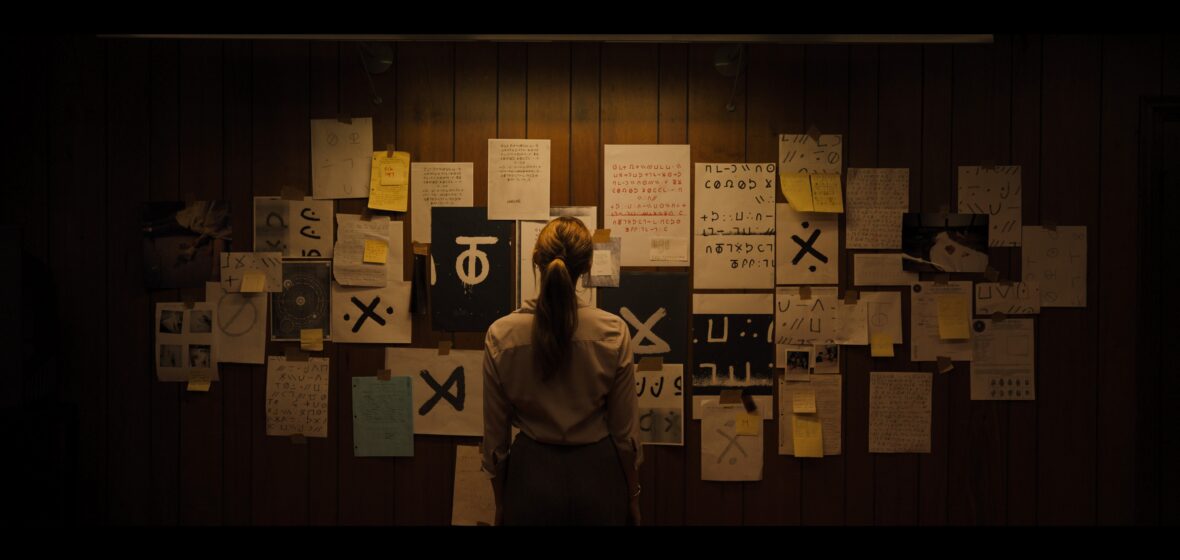The best way to approach Longlegs, the new horror thriller from one of the genre's distinctive auteurs, Osgood Perkins (son of Anthony Perkins), is to curb one's expectations.
It has been lauded as an intense and unforgiving experience that slowly builds up from raising the hair on the back of your neck to blood-curling uncomfortableness. While that may very well be true, expecting that outcome is the first step in not getting the best out of it. A principal rule to watch a horror film is to take it as a blank slate. Expect nothing, and you won’t be swayed by the crushing disappointment of cynicism. Like Stephen Park said in A Serious Man, “Accept the mystery”.
The film stars Maika Monroe as Lee Harker, an inexperienced FBI agent whose psychic powers get her assigned to a strange case – a series of whole families dead in a string of bizarre murder-suicides are connected by a mysterious message in a cryptic code always signed Longlegs. After Harker discovers a serial killer on a strong hunch, her superior Agent Carter (Blair Underwood) takes the chance to finally make some ground on the case. Harker gets on it and quickly discovers a pattern in the killings and important imagery and symbolism left around. Maybe it’s because she lives alone in a little shed in the woods, albeit a nice and modern one, whose only contact outside of work is with her mother she talks to on the phone. Maybe, unlike her colleagues, she’s not distracted by the mundane of ordinary life, family, bars, and friends. Maybe because as soon as she’s assigned to the case, she gets a letter from Longlegs explaining how to crack the code.
No one has much personality beyond what we see on a surface level. Maika plays Harker like an alien who is still getting used to her human body. She moves slowly like she’s levitating. She has no quirks, hobbies, or real life outside her job. Her home looks like it’s decorated in the woods for holiday rentals. There’s no television, music, or inkling of a life outside her regular hours. In the office, she does what she’s told without questioning.
I feel that all this is by design. Harker is haunted by trauma, and trauma is personal. We’re not supposed to understand it, nor do two different people affected by the same traumatic experience behave the same way. Closer to the end, after a moment of desperation, Harker lets go of a bellowing scream of pain and rage. It wouldn’t have been as effective had she not been portrayed with such unconventional stoicism.
Central to this is the monster – Nicholas Cage is a disturbing human suit that dwells somewhere between Buffalo Bill from Silence of the Lambs and Mrs. Doubtfire. The film doesn’t hide who he is, but it does well to hold on revealing what he looks like until it’s essential. It’s a perfect vessel for Cage to release his unhinged energy. It’s kept secret where he came from and how he came to be. This is not a psychoanalytical film, but the mystery remains tense. However, we get odd and puzzling details that flesh him out slightly. He doesn’t seem to be driven by a sexual pathology or political ethos. He has a little obsession with the music of Marc Bolan, perhaps the only relatable thing in that character (we should all be a little obsessed with the music of Marc Bolan).
The strength of Longlegs is the atmosphere. Dark and foreboding, it feels like the last two episodes of the first season of True Detective. The final sequence delivers the intense goods, but so much comes from Perkins riffing off his masters. We find Jonathan Demme’s touch from Silence of the Lambs and Kubrick from The Shinning. The nights are shot like Michael Mann, and the days have that Mark Romanek touch where even the warm colours feel cold and unsafe. It makes sense that the cinematographer, Andres Arochi, signs his first feature after a career in music videos (like Romanek).
Perkins knows his script isn’t a mind-bending whodunnit mystery, but he wants his viewers to have a visceral reaction to it. Some shots are framed oddly, and others are lit in anachronistic ways (like a nighttime scene in an attic where the light shining through the window is a blaring white spotlight). I searched the background, expecting to see something I didn’t want to. It made me uneasy, scared of what was going to happen after. And that’s the experience we should be asking for from sitting in a dark room for 100 minutes.
Verdict: 4 out of 5
A treat for horror thriller fans who like the vibes more than uncovering the mystery. Exquisitely well-directed and lit if meagre in the script front.




